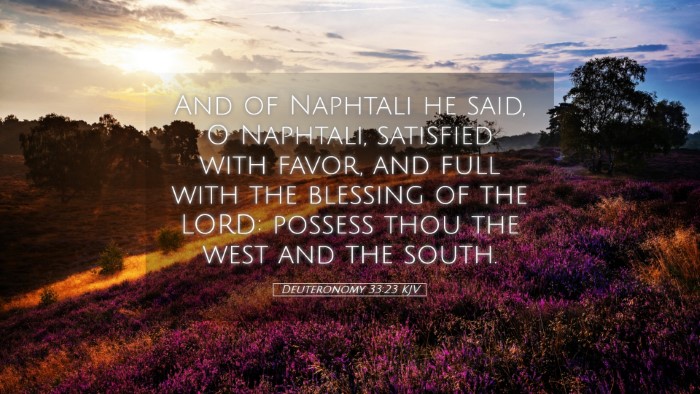Commentary on Deuteronomy 33:23
Deuteronomy 33:23 states: “And of Naphtali he said, O Naphtali, satisfied with favor, and full with the blessing of the Lord: possess thou the west and the south.” This verse is part of Moses' final blessing upon the tribes of Israel before his death, and the specific mention of Naphtali is rich with theological and historical implications.
Contextual Overview
The Book of Deuteronomy serves as a vital document for understanding the covenant between God and Israel, detailing laws, social conduct, and prophetic blessings. In the verses leading up to 33:23, Moses addresses each tribe and articulates both their identity and their future inheritance as they prepare to enter the Promised Land.
Analysis of Key Elements
- Identity of Naphtali: Naphtali, the sixth son of Jacob and Bilhah, is often associated with traits of agility and swiftness (Genesis 49:21). This characteristic is mirrored in the tribe’s destiny and blessings.
- Satisfaction and Favor: The phrase “satisfied with favor” implies abundance and God’s approval. Matthew Henry notes that this satisfaction is not simply material but encompasses spiritual well-being, indicating that Naphtali is in a favored position regarding God’s grace.
- Full with the Blessing of the Lord: The abundant blessings further reflect God's providence. Adam Clarke emphasizes the idea that the Israelites were to live in a state of communion with God, which would yield true fulfillment.
Theological Implications
This verse is remarkable not only for its immediate blessing to Naphtali but also for what it teaches about God’s character and His intentions towards His people.
- God's Blessings: The fullness of blessing denotes bounteousness in both land and resources. Albert Barnes highlights that God’s blessings are comprehensive, affecting all areas of life, which is indeed a relevant concept for pastoral conversations today.
- Occupying the Promised Land: The directive to “possess thou the west and the south” underscores the encouragement for Naphtali to actively take hold of their promise. This notion of active faith is a message echoed throughout Scripture, prompting believers to claim their spiritual inheritance in Christ.
Historical Context
In the historical context, the territory allotted to Naphtali was geographically advantageous, bordering the Sea of Galilee and featuring lush land. This strategic location nourished the tribe and allowed it to emerge during times of conflict—a theme elaborated upon by Clarke, who remarks on Naphtali’s role in significant military engagements, including Barak’s victory over Sisera (Judges 4).
Reflections for Believers
For contemporary readers, this verse challenges us to consider how we perceive and respond to God’s blessings. Just as the Israelites were encouraged to recognize their inheritances, so too must Christians today become aware of the spiritual riches they possess in Christ.
- Embrace of God’s Favor: Understanding that favor from the Lord does not equate to a life devoid of challenges can reshape our theology of suffering and prosperity.
- Active Participation: Pastors can encourage congregants to actively participate in claiming their blessings. The narrative of Naphtali fosters a sense of agency and responsibility towards God's promises.
- Community and Heritage: Believers should foster a communal understanding of faith, just as the tribes of Israel were blessed collectively. This verse prompts questions about how blessings are shared within the body of Christ.
Conclusion
Deuteronomy 33:23 serves not only as a historical benediction but also as a perpetual reminder of God’s faithfulness. The insights from public domain commentaries illuminate the multifaceted blessings experienced by Naphtali, challenging readers to deeply reflect on their responses to God’s favor. As we study this verse, pastors, students, theologians, and scholars alike are encouraged to seek a deeper relationship with God, recognizing that His blessings are both a gift and a call to action.


